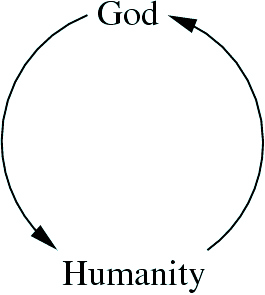Religious Concerns
Christianity in brief
[Jesus] is the refulgence of God’s glory,
the very imprint of his being,
and he sustains all things by his mighty word.
— Hebrews 1⋅3
“I am the Alpha and the Omega,” says the Lord God,
“the one who is1 and who was and who is to come, the almighty.”
— Revelation 1:8 (spoken by God)
I am the Alpha and the Omega, the first and the last, the beginning and the end.
— Revelation 22⋅13 (spoken by Christ)
Christ became man that man might become God.
— St. Athanasius
The English word religion
comes from the Latin religio,
whose roots re+ligare mean “to
tie/draw-tight/close-the-contract again”. This implies that a bond between
God and us has been broken, and needs to be repaired.
 Christianity teaches that this separation
is caused by a fundamental choice on humanity's part for selfishness.
We are born broken, and cannot repair ourselves.
Our union with God can be repaired by God alone,
in Christ.
Christianity teaches that this separation
is caused by a fundamental choice on humanity's part for selfishness.
We are born broken, and cannot repair ourselves.
Our union with God can be repaired by God alone,
in Christ.
- In his birth and in his teachings, Christ has descended from the
unlimited reality of God and entered the finite reality of humanity,
becoming human like us: he brings the divinity down to humanity.
- In his suffering, death, and resurrection, Christ rises from the
finite reality of humanity to the infinite reality of God, but not alone: he carries humanity
into union with the divinity.
This union is possible only if Christ is both human and divine:
- Unless he is human, he does
not bring humanity to God.
- Unless he is divine, he cannot bring humanity to God.
Christ brings about something new,
something more glorious than
we had before! As St. Paul writes, we shall bear the likeness
of the man from heaven. St. John writes that we shall be like God, for
we shall see him as he is. St. Peter writes that we will participate in the divine nature.
As such, a Christian ought to live not as as though s/he resembles the
dust, but as though s/he resembles God!
Be perfect, as your heavenly Father is perfect. — Matthew 5⋅48
 Christianity teaches that this separation
is caused by a fundamental choice on humanity's part for selfishness.
We are born broken, and cannot repair ourselves.
Our union with God can be repaired by God alone,
in Christ.
Christianity teaches that this separation
is caused by a fundamental choice on humanity's part for selfishness.
We are born broken, and cannot repair ourselves.
Our union with God can be repaired by God alone,
in Christ.